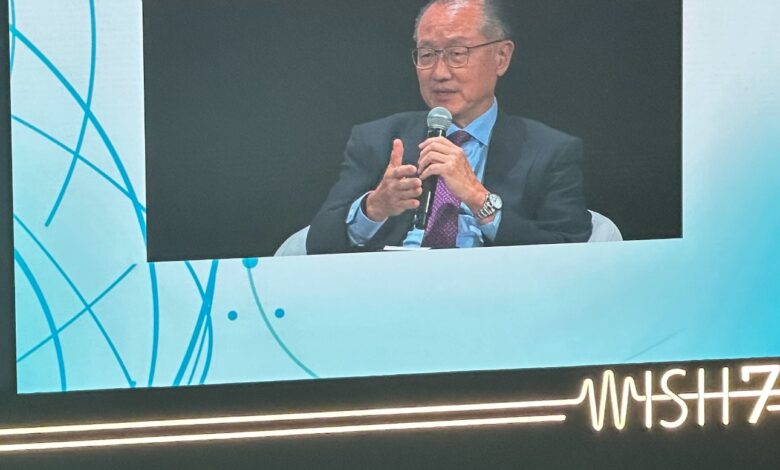
Renowned American-Korean global health leader and anthropologist, Jim Yong Kim, headlined the World Innovation Summit for Health (WISH) session “Anxiety, Loneliness, and the Fate of Gen Z: Tackling the Unprecedented Global Mental Health Crisis” which took place in November.
Kim, a prominent figure in addressing global health challenges, brought his unique perspective to the discussion by focusing on the psychological impact of technology and social media on young people, particularly Generation Z.
Prior to his role as the 12th President of the World Bank from 2012 to 2019, Kim held office as the President of Dartmouth College from 2009 to 2012.
Before entering academia and global leadership roles, Kim co-founded Partners In Health, a non-profit organization dedicated to providing healthcare to impoverished communities worldwide. His work in global health has been widely recognized, earning him accolades such as a MacArthur “Genius” Fellowship and recognition as one of Time magazine’s 100 Most Influential People in the World.
The session mainly revolved around the advent of smartphones that has revolutionized the way we connect, communicate, and consume information – however, this technological advancement has also brought about unintended consequences, particularly for the younger generations.
The emergence of social media and constant connectivity has led to a surge in mental health issues, including anxiety, depression, and even suicide.
The toll of loneliness
Kim emphasized that loneliness, often exacerbated by excessive screen time and reduced face-to-face interaction, has been linked to a host of physical and mental health problems. Studies have revealed that loneliness’s impact on health could be equivalent to smoking 15 cigarettes a day. It can heighten the risk of anxiety, depression, cardiovascular disease, and low immunity.
Kim made a reference to social psychologist Jonathan Haidt, who argues in his book The Anxious Generation that human children have historically developed their brains through synchronous, social play. This process, known as attunement, involves interacting with others in real-time, learning social cues, and developing empathy.
However, the rise of smartphones and social media has disrupted this natural developmental process.
Modern children spend increasing amounts of time online, engaging in asynchronous, performative interactions. This shift, according to Kim, has led to a decline in face-to-face social interaction, which is crucial for healthy brain development.
As a result, rates of anxiety, depression, and suicide have skyrocketed among young people, particularly girls.
Kim added that some studies have shown that limiting screen time and banning smartphones in schools can lead to significant improvements in mental health. By encouraging face-to-face interaction and unstructured play, young people could largely develop the social skills and emotional resilience they need to thrive.
The impact of social media on mental health
Social media platforms, designed to foster connection, have paradoxically become breeding grounds for isolation, comparison, and negative self-perception. The curated, often idealized, images and posts shared online can create unrealistic expectations and foster feelings of inadequacy.
Constant exposure to such content can lead to increased levels of anxiety and depression, particularly among young people.
Kim clarified, “The remarkable thing is that among people 50 and older, anxiety and depression really didn’t go up at all in the period 2010 to 2020,” adding that, “I mean – and among the millennials, you would expect – because some people have argued that it was the economic crisis of 2008, 2009. And then what you’d expect is that – because after that, there was the most prosperous time of job creation. Unemployment levels were the lowest.”
“You’d expect that the rising level of anxiety among Gen Zers would go down, but it didn’t. Other groups, not in Gen Zers because, again, there’s no sort of genetic evidence that that’s what happened, but it just seems now patently obvious that that’s what it was,” he said.
He delved into the further ramifications of social media’s addictive nature, which can disrupt sleep patterns, reduce productivity, and impair social skills.
The fear of missing out, aka FOMO, can lead to compulsive checking of notifications, further exacerbating mental health issues.
The smartphone generation and mental health
The proliferation of smartphones and social media has coincided with a significant increase in mental health problems among young people, particularly Generation Z. The constant barrage of information and the pressure to curate a perfect online persona can take a toll on mental well-being.
He identified the root cause of the problem, clarifying, “It started right in 2010…if you look at what happened between 2010 all the way to 2023, that’s where we have the data for. The rise in anxiety and depression among the Gen Zers throughout the world has been absolutely dramatic. And it correlates exactly with the arrival of the iPhone 4, the front-facing camera. And then with the advent of the rollout of high-speed Internet access everywhere.”
He cited an example saying, “Korea, interestingly, was one of the most wired countries from the very beginning. Samsung is a Korean company. They came out with the front-facing camera in the same year, just a few months after the iPhone 4. And the evidence for the direct connection of social media – you know, Instagram came out in 2011, was bought by Facebook in 2012. It just exploded as a medium.”
He added, “And it went from five to 10 million subscribers to 90 million just in a couple of years. That the correlation between access to social media and these rising rates of anxiety and depression, I think, are just undeniable. So it was specifically the fact that children start developing and growing their brains, their neural connections, through actual interaction with people.”
Moreover, Kim stressed that research has shown that excessive screen time can disrupt sleep patterns, impair cognitive function, and lead to increased feelings of loneliness and isolation.
Social media can also contribute to negative body image, cyber-bullying, and anxiety about social status.
Addressing the crisis
To combat the mental health crisis, Kim suggested a multi-faceted approach including:
- Policy interventions: Governments should implement policies that regulate social media platforms, protect user privacy, and promote digital literacy.
- Parental guidance: Parents should set limits on screen time, encourage face-to-face interaction, and model healthy digital habits.
- Mental health awareness and support: Schools and communities should prioritize mental health education and provide access to mental health services.
- Individual responsibility: Individuals should be mindful of their screen time, practice mindfulness techniques, and seek help when needed.
When asked at the end of the session if he thinks that the fight against mental illness is getting harder, he replied, “Yes, because of social media! People can use social media to just perpetrate the craziest ideas. And it feels, you know, the whack-a-mole has multiplied. There are just so many moles coming at the same time.”
However, by tackling the underlying causes of mental health issues and promoting digital well-being, Kim believes there is still a silver lining to mitigate the negative impacts of technology and create a healthier, happier future for generations to come.
“I see now, for example, at my alma mater, the brilliant dean of the School of Public Health has built an entire unit focused on public health communications. And I think that’s not something that a lot of public health schools have done, but I think it’s precisely what we need. We need the tools to fight back and actually get real information.”
Kim wrapped up the session on a positive note, “I’m not quite sure how to do that, but that’s why I’m here. That’s why I’m talking about it because this is serious. One good thing is that what I found in terms of finding potential allies and supporters and even donors, just about everyone I know is one degree or less separate from somebody who really struggles with mental health.”
The seventh WISH conference took place in Doha bringing together over 200 global healthcare experts under one roof from November 13-14.
It was hosted by the Qatar Foundation (QF), founded in 1995, aiming to drive the country’s transformation into a knowledge-based economy by providing culturally relevant programs, stimulating groundbreaking research, and empowering communities.




